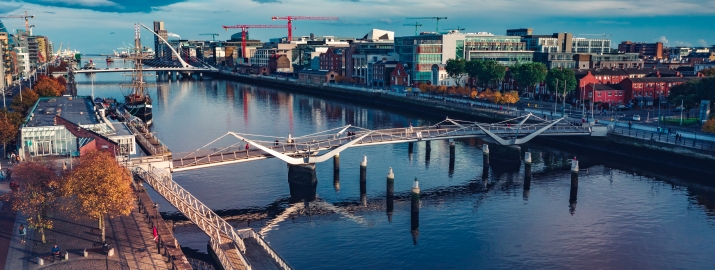
Living in Dublin: A Guide for Beginners
What is it really like to live in Dublin?
In recent years, Dublin has become a very international and multicultural city, and many expats now call Ireland’s capital home. Well, visiting a city as a tourist or on a business trip is one thing, while calling it home is an entirely different case.
When I decided to move to Dublin, the first question I received from my family and friends “Are you going to put up with the weather?” Well, this was something I was worried about at the beginning too but when I finally settled, I realized my fears were pointless.
This is why I thought a comprehensive guide about living in Dublin Ireland would be useful for our fellow digital nomads who want to get a taste of living in Dublin.
Let’s begin!
Why Move to Dublin
Dublin, like other capital cities, provides excellent amenities, a thriving social scene, and a cosmopolitan atmosphere. However, life in this city is unique in many ways. Life in Dublin has all of the benefits you would expect from a city while still maintaining a laid-back atmosphere. You won’t be subjected to the chaos that is common in other capital cities. Irish people are known for their friendliness, politeness, and laid-back attitude.
Much of Dublin’s life’s strength stems from its small size. Dublin is a small city with a population of just under 1.5 million people. When you start living in Dublin, you’ll realize that the city is easy to navigate, and almost everything is within walking distance. Dubliners travel from point A to point B on foot or by bicycle.
These were the main reasons why I decided to move to Dublin. Until today, it hasn’t disappointed me. Still, I’m going to list some advantages and disadvantages to make things easier for you.
Living in Dublin: Advantages and Disadvantages
Some of the advantages of living in Dublin, Ireland’s capital city, include but aren’t limited to the following:
1. Diversity
When you look at Dublin city demographics, you’ll see that people from all over the world live here. About one-fifth of the population is foreigners. This means that no matter where you’re from, you’re going to feel at ease. Even if you get homesick, it isn’t going to be too difficult to find food and friends from your home country to help ease the pain.
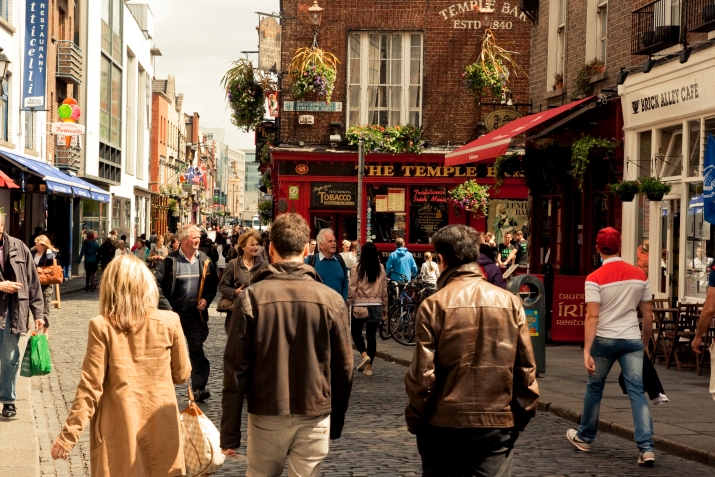
2. Friendly People
Dublin has repeatedly been named one of the friendliest cities in Europe and the world. As a result, when you arrive, you can expect a warm welcome. Dubliners are known for their chattiness, quick wit, and tolerance. According to a recent EU survey, Dublin is a great place to live for both immigrants and members of the LGBT community. I can tell from experience that it’s true.
3. Activities
Dublin has a rich history and a vibrant culture that is evident as you walk through the city streets. Throughout the city, you’ll find picture-perfect Georgian townhouses, classical Edwardian facades, and picturesque Victorian parks.
Dublin also has internationally renowned museums and galleries, many of which are free to the public. Not to mention the city's fantastic pubs, festivals, and nightlife. When you live in Dublin, you'll never run out of things to do or places to visit.
4. Green Spaces
Dublin’s beautiful mountains, coastlines, canals, and rivers provide endless outdoor recreation for anyone who enjoys the great outdoors. The nearby mountains and sea provide a peaceful respite from the hustle and bustle of city life and are great opportunities to achieve work life balance. But there are also many parks and gardens in the city center. Phoenix Park, one of Europe’s largest urban parks, is one of them.
Now, time to disclose the disadvantages of living in Dublin:
1. Transportation
The most inconvenient aspect of living in Dublin is without a doubt public transportation. If you live in an outlying suburb or village, you may be able to take the LUAS (tram) or DART (coastal train) into the city center. If not, you must get used to the unpredictability of the Dublin Bus. Buses are never on time, and many times they don’t show up at all…
2. High Cost of Living
Dublin is one of Europe’s most expensive cities. Period. Rent is expensive by European standards, and the overall cost of living, including food and necessities, is pricey too. This is why you should plan your budget well if you’re determined to live in Dublin.
3. Construction Everywhere
Constant construction and unbearable traffic go hand in hand in Dublin. It’s a beautiful thing that the city is thriving and growing but note that you’ll be seeing a lot of construction sites while you’re living in Dublin.
Best Places to Live in Dublin
Now that you’re aware of the pros and cons of living in Dublin, it’s time that you become familiar with the neighborhoods. Here are my favorite neighborhoods in Dublin so far!
Portobello
Portobello is regarded as one of Dublin’s most fashionable neighborhoods. This neighborhood is the cultural heart of the city, with a mix of artisanal brunch spots and lively Irish pubs.
In Portobello, there is a good mix of modern apartments and refurbished terraced houses. You can join the after-work crowd for a pint by the canal, or listen to live music at the infamous Whelan's pub. The cultural highlights of the city will be right outside your door if you decide to live in this lively neighborhood.
Smithfield
Despite being in the Dublin city center, Smithfield retains an off-the-beaten-path feel. This area, known as the artistic quarter, is ideal if you’re looking to immerse yourself in Irish culture. The LUAS (Irish subway) runs right through Smithfield, making it easy to get around the city. Smithfield Square is spanned by a wide cobblestone walkway, surrounded by deco coffee shops, poetic street art, and even the Jameson Whiskey Distillery.
Stoneybatter
Stoneybatter, which is close to Smithfield, has the advantage of being close to town while retaining its residential charm. The highlight of this neighborhood is its proximity to Phoneix Park, which you can reach in around a 10-minute walk. This park is open seven days a week, 24 hours a day. As a result, you can get out in nature whenever you want. This is what I do every morning…
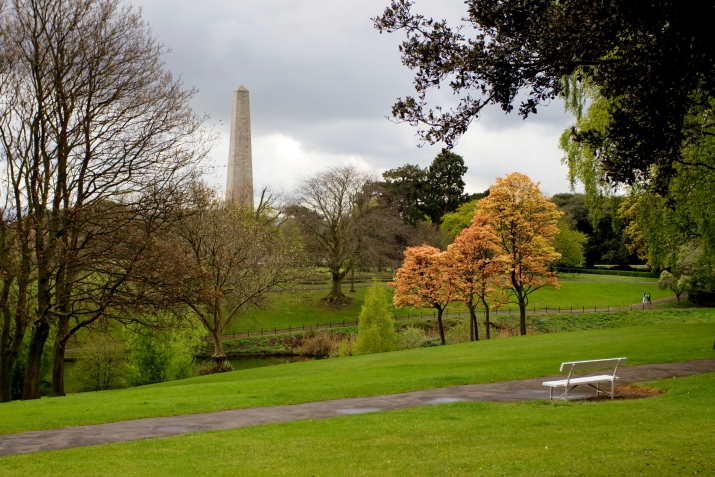
St. Stephen’s Green
If you enjoy nature but also want to be close to the action, St. Stephen’s Green is the place to be. St. Stephen’s Green, dubbed Dublin’s playground, makes up for its small size with its design and proximity. On a sunny day, you’ll see locals sitting on the grass and enjoying their lunch break. Plus, there are numerous outdoor events throughout the summer. The properties in St. Stephen’s Green are usually smaller and old.
Transportation
How To Get to Dublin
Ireland is an island nation, and Dublin is well connected to the rest of Europe by air and sea, as well as to the rest of the island by road and rail. Flights take two hours or less from Paris, Amsterdam, Brussels, Berlin, and Luxembourg. Flights to Dublin airport from UK cities such as London, Liverpool, and Edinburgh are even shorter.
Also, regular ferry services connect Dublin to England, Wales, France, and the Isle of Man.
How To Get Around Dublin
Before going into the details of getting around in Dublin, let me say this: It’s a very compact city and I’m speaking from experience that you can reach many districts by foot in around 30 minutes.
Still, it’ll come in handy to be aware of your options. Dublin Bus operates a network of over 100 routes that connects the majority of the city. There is also another bus company, Go-Ahead Ireland, which operates more than 20 routes throughout the city.
Train and tram are other effective transportation options you can avail of while living in Dublin.
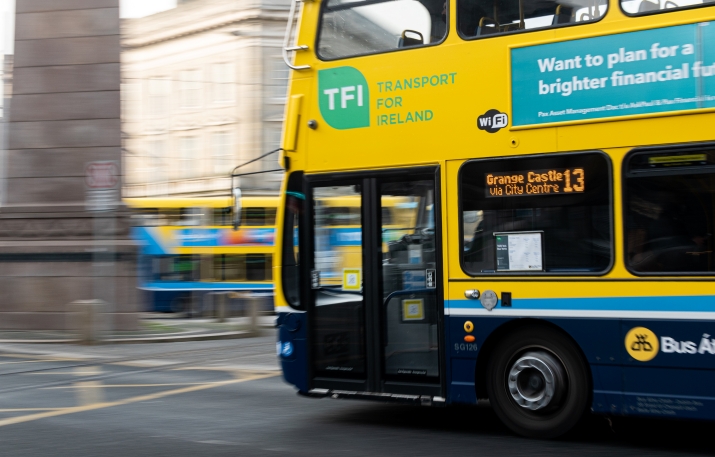
Taxis
Taxi apps like Lynk and Free Now are a good option if you need a ride quickly. Taxi ranks can also be found throughout the city.
Cycling
Dublin Bikes, the city's bike-sharing scheme, is an easy and affordable way to get around without having to buy or store your bike. You can find these shared bikes in strategic locations throughout Dublin. The first 30 minutes are always free; after that, you will be charged according to the length of your session.
Leap Card
The Leap Card is the key to all of Dublin’s public transportation. It’s the most convenient and cost-effective way to use Dublin’s public transportation, and it can be used on the train, tram, bus, or to rent a Dublin Bike.
Accommodation in Dublin
Accommodation in Dublin is available, but it is limited – and the cost reflects this. In recent years, demand has been driven by excellent employment opportunities, a thriving multinational sector, and a high density of third-level institutions.
The government is attempting to address the issue, and new developments are underway, but the shortage is expected to persist for some time.
Renting in Dublin
It’s true Dublin is the most expensive county in Ireland to rent in. The government has taken several incentives to prevent high increases, such as introducing a rent cap, but renting an apartment in Dublin can still be expensive for many digital nomads and remote workers who rely on an average income.
Monthly rents for a one-bedroom apartment in a central location usually start from €1,400. But it’s possible to find rooms at a lower rate, so don’t despair!
Rents rise in the south of the city. Any accommodation along the coast will most likely be expensive as well. However, rents are lower in the north and west.
Thanks to Dublin's well-connected transportation network, you can also choose to live in a nearby county instead. Meath, Kildare, and Wicklow all have easy access to Dublin and have lower rents.
Cuisine
Dublin has four Michelin-starred restaurants, so there are plenty of opportunities for fine dining. However, you don’t have to go to a high-end restaurant to have a delicious meal. Despite Dublin’s reputation for constant rain, you’ll find markets and food trucks selling delicacies all over the county. Every summer, there is also an outdoor food and drink festival in the city.
The food scene in Dublin is as diverse as the city itself. There are many Chinese food stores and restaurants to choose from. A cluster of Asian eateries and shops can be found on Parnell Street, just off the city’s main thoroughfare.
You can find Brazilian coxinha, halal meat, Polish kielbasa, Vietnamese takeout, Indian samosas, and African jollof rice on Moore Street. This strip also hosts traditional Dublin street traders selling fish and fruit.
Drinking
You probably already know that Dubliners enjoy drinking, more than coffee. It wouldn't be wrong to say that social life in Dublin revolves around pubs. Since 1759, the city has been the home of Guinness. The original location of the St. James' Gate Brewery is still in the heart of the city, and the Guinness Storehouse is one of the country's most popular attractions today. It is also one of the first places I visited when I moved to Dublin.

Activities
One of the most significant advantages of living in Dublin is that you will never be bored. Whatever you enjoy doing in your spare time, you’ll find plenty of options right outside your door. This is one of the reasons why I love living in Dublin so much.
Dublin has it all, from festivals and nightlife to sports and outdoor activities. Dublin, as the capital city of Ireland, is home to world-class galleries, museums, and tourist attractions, many of which are free to visit.
Mountains and Sea
Dublin’s spectacular natural sights are never far away, thanks to its ideal location between the sea to the east and the mountains to the south. As a result, the city is an excellent choice if you enjoy outdoor activities. Surfing, sailing, sea swimming, climbing, and biking are all popular pastimes among the locals. Not into sports? So just relax and enjoy the scenery.
The beautiful Dublin coast and mountains provide a nice break from Dublin city centre. One of the most appealing reasons to live in Dublin is the proximity to nature as well as all of the amenities that come with city living. I definitely love it.
Nightlife
As the sun sets on the Liffey and darkness falls, pubs, late bars, and nightclubs fill with people who love Dublin’s vibrant nightlife. There are approximately 772 pubs in Dublin, so you won’t have trouble finding a place to have a jar. (That’s slang for a pint in Dublin!) The River Liffey divides the city into north and south. Temple Bar, which is synonymous with Dublin’s nightlife, is located on the river’s south bank. There are numerous pubs and restaurants lining the cobblestone streets.
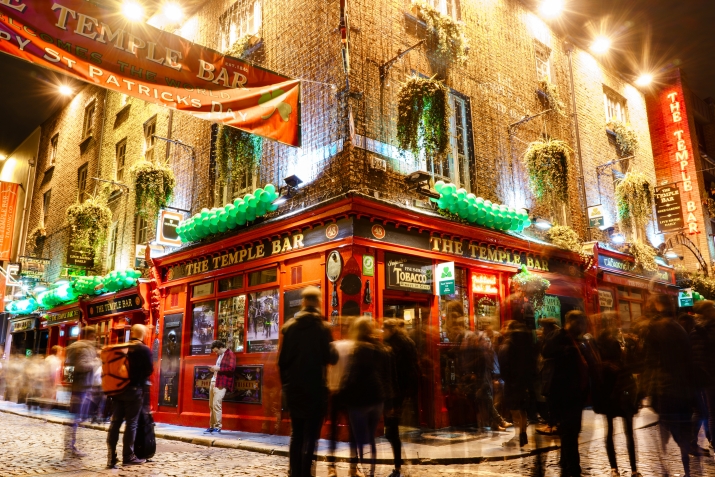
Famous O’Connell Street in Dublin is located to the north. A number of smaller streets thrive at night off this main thoroughfare. Parnell Street, Abbey Street, and Capel Street are all good places to find local pub and bar options.
Cost of Living in Dublin Ireland
Dublin is less expensive than other Scandanavian capitals, such as Copenhagen, Oslo, and Helsinki but it is more expensive than Amsterdam, Berlin, and Barcelona. The residents of neighbor London also pay slightly more for everyday necessities. If you’re single, you can live on around €900, excluding rent.
Here is a table that will give you a better understanding of living expenses in Dublin. I’ve also added a benchmark section where you can make a comparison with London and New York.
Meal, Inexpensive Restaurant | €15 |
Domestic Beer | €5.75 |
Cappuccino | €3.65 |
Milk (1 liter) | €1.04 |
Loaf of Fresh White Bread | €1.64 |
Rice (1kg) | €1.28 |
Eggs (12) | €3.08 |
Local Cheese (1kg) | €8.63 |
Apples | €2.37 |
Banana (1kg) | €1.63 |
Cost of Living in Dublin vs. London
- Consumer prices in Dublin are 8 percent lower than in London (without rent)
- Rent prices in Dublin are 16.76 percent lower than in London
- Restaurant prices in Dublin are 8.28 percent lower than in London
- Groceries prices in Dublin are 0.19 percent higher than in London
- Loca purchasing power in Dublin is 3.68 percent lower than in London
Cost of Living in Dublin vs. New York
- Consumer prices in Dublin are 25 percent lower than in New York (without rent)
- Rent prices in Dublin are 43 percent lower than in New York
- Restaurant prices in Dublin are 27 percent lower than in New York
- Groceries prices in Dublin are 38 percent lower than in New York
- Local purchasing power in Dublin is 21 percent lower than in New York
Is Dublin Safe?
Ireland is a safe country to visit and live in general. In fact, it is one of the world’s safest countries. But Dublin, unfortunately, is not as safe as other parts of Ireland. Dublin, like any other capital city, has a higher crime rate than the rest of the country due to its large and dense population. Thefts and burglaries are becoming more common in the city, according to the statistics.
No one can deny that Dublin has its fair share of pickpockets and other lawbreakers. As a result, you should exercise the same caution that you would in any other major city. Keep your valuables secure, avoid walking alone at night in dimly lit areas, stay alert, and keep your phone nearby at all times.
Is It Easy To Meet New People and Other Expats in Dublin?
The short answer is yes! I know that moving to a new location can be intimidating it’s easier in Dublin thanks to its friendly people and a big community of expats.
Tips To Meet New People in Dublin
- Join meetups, such as the Latinas and Espaolas Sunday Coffee Meet Up and American expats.
- Trustworthy: as one of the top rated, long standing online global money transfer providers in the industry
- Mingle with locals other through events and pubs. Hey, you're in Dublin!
- Join language exchanges where you can meet both locals and expats where everyone practices their own language with each other while living in Dublin
Work in Dublin
Dublin is a desirable location for both innovative startups and global corporations. This also means that it’s an excellent location for finding exciting jobs and networking opportunities.
With many tech, pharmaceutical, and financial services companies based in Dublin, the city benefits from many of these opportunities. Google employs approximately 7,000 people while both Amazon and Facebook employ approximately 5,000 people.
While living in Dublin can be expensive, the good news is that salaries are higher than in other parts of Europe.
Starting Your Own Business in Dublin Ireland
Ireland has a global reputation for being a welcoming country for startups. Because of the city's small size and open attitude, entrepreneurs from all over the world have easy access to relevant decision-makers, as well as some fantastic networking opportunities.
Living in Dublin and starting a business there will also give you access to the city's thriving startup ecosystem. While Irish government agencies can assist you, there are numerous innovative accelerators and incubators available to assist you in quickly turning your business plan into a reality.
Startups in Dublin have access to a variety of financial and non-financial resources. Mentoring, training, funding, and financing are also available from organizations such as Enterprise Ireland.
Entrepreneurs from the EU, the United Kingdom, Norway, Iceland, Switzerland, and Liechtenstein can establish businesses in Ireland without the need for a visa or immigration permission. Those coming from other countries, on the other hand, will need to apply for residency first.
There is a special Startup Entrepreneur Programme for anyone who wants to move to Ireland to start or grow a business.
Coworking Spaces in Dublin Ireland
Coworking in Dublin is very developed, providing a new type of workspace for both startups and established businesses. When you sign up for a coworking space in Dublin, you become a part of a collective, an active member of a community of like-minded creators, innovators, and entrepreneurs.
Coworking spaces in Dublin are provided by global brands such as WeWork as well as local businesses such as Iconic Offices and Glandore. There are also government-funded Enterprise Centres located throughout the city.
What Else You Need To Know About Living in Dublin Ireland
There you have it. I believe this guide has shed some light on how life in Dublin will turn out to be for you. Life abroad is never easy and expat life can be difficult from time to time. However, Dublin is a great choice if you’re planning to live in Ireland. It’s a great base to explore the rest of Europe and presents many opportunities for newcomers.
Have you ever visited Dublin? Have you thought of living there? Let us know. If you need more insights, feel free to reach out or visit our growing forum where digital nomads share their experiences.
Frequently Asked Questions About Living in Dublin Ireland
Is Dublin a good place to live in?
According to Mercer's Quality of Living survey, Dublin ranks higher than Edinburgh and Belfast. Despite its housing crisis, Dublin remains one of the best cities to live in, according to Mercer.
What salary do I need to live in Dublin?
On average, €60,000 annually will be enough to live in Dublin on your own. If you're moving with your family and children, you'll need more though.
Is Dublin expensive to live in?
Dublin is not the cheapest city as you probably already know. But it's manageable if you find affordable accommodation and have a good income. It's an expensive city but it's worth it.
Is living in Dublin Ireland good for foreigners?
Yes, it is. With the arrival of international companies and quality living, families and expat residents flock here, where they are often greeted with a warm welcome. Expat life is very easy in Dublin Ireland.
Are Irish people friendly?
Yes, they are. Irish people tend to be very talkative and you'll notice that they will welcome you very easily when they find out that you're a newbie in town.
Is there a strong expat community in Dublin?
Yes, there is. Since most tech companies have their European headquarters in Dublin, expats move to the city with their families which leads to a powerful expat community.
Is Ireland an English speaking country?
The country's official languages are Irish and English. While Irish is taught in all schools, English is the most commonly spoken language in Dublin.
Should I move to Dublin or London
Dublin is a city that has a small-town feel to it. London, on the other hand, exudes a more big-city vibe. If you enjoy big cities and exploring the arts and culture, London is the place to be. However, if you want to soak up some amazing local hospitality, Dublin is the place to be.
Is Dublin more expensive than London
The cost of living in London (United Kingdom) is 17% higher than in Dublin (Ireland).






